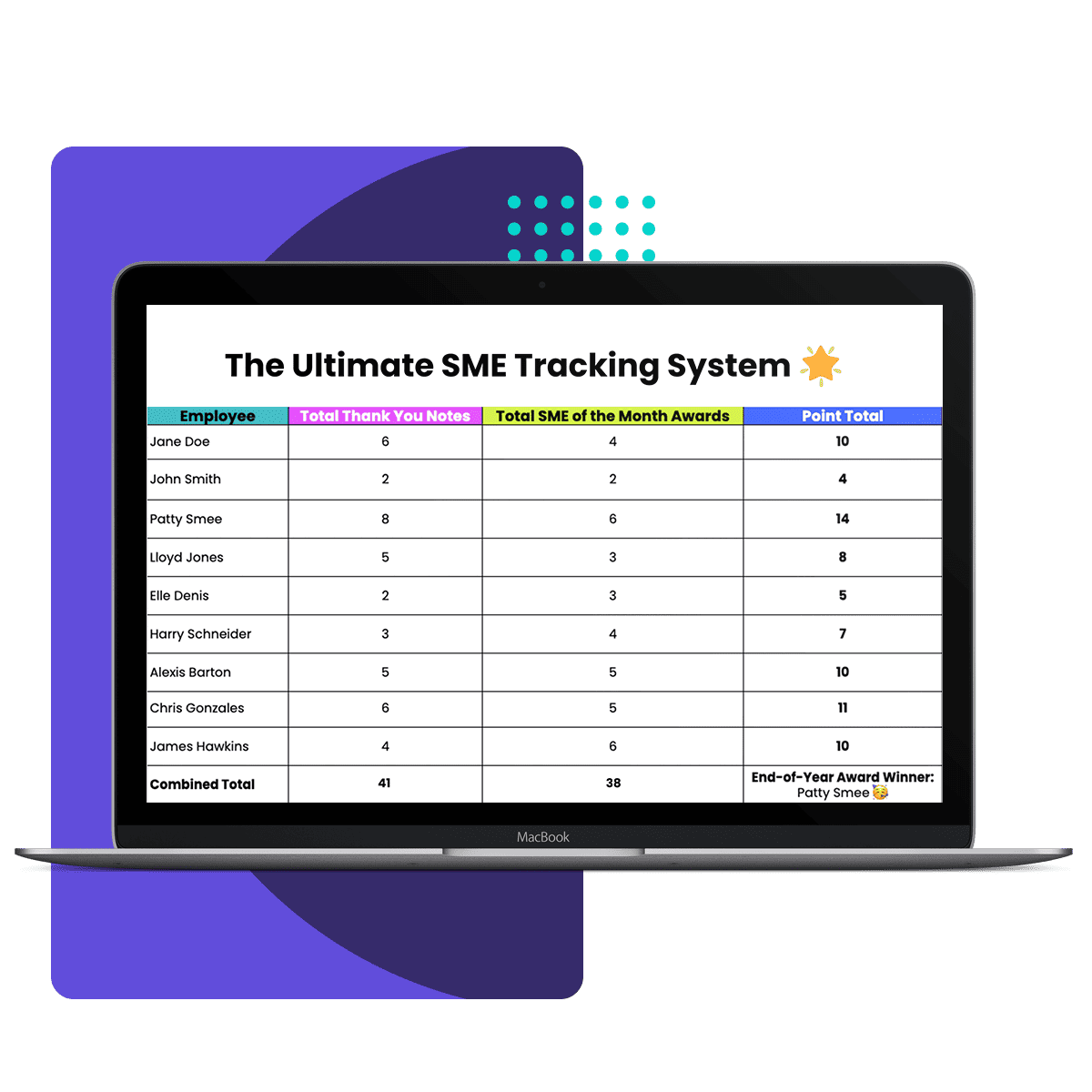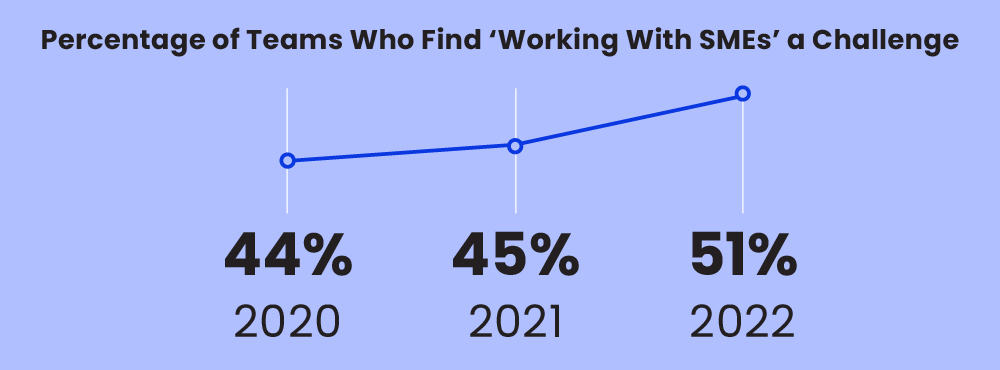Guides & Templates
The Ultimate Guide for Working With SMEs
Use this guide to gamify the proposal process and work effectively with SMEs on your next RFP.

Table of Contents
Roles of Subject Matter Experts (And How RFPs Fit In)
Subject matter experts—also known as SMEs—are professionals with a deep understanding of a specific subject (think of a data analyst, product manager, or cybersecurity expert). While a SME’s role may vary based on their title, they often have one thing in common. They’re frequently asked to provide information for proposals. Each SME brings unique insights and details, which can help your proposals stand out from the crowd.
Yet, according to Loopio’s 2023 Trends Report, 51% of proposal teams say working with SMEs is their biggest hurdle. And for the past three years in a row, almost half of RFP teams cited collaboration with SMEs as a top challenge.

The silver lining? Building a productive working relationship with SMEs may be your key to getting ahead of the competition.
In this guide, you’ll learn unique collaboration strategies from real RFP experts from Datavail and Heitman. Plus, come away with an actionable template to transform your SME relationships from challenge to competitive advantage.
Why Work With Subject Matter Experts on Proposals?
Subject matter experts bring a wealth of knowledge that enhances the specificity of your proposals and ultimately wins your organization more business. Tapping into a SME’s area of expertise can be the difference between a comprehensive proposal and a generic one.
Developing a successful relationship with SMEs will differentiate your organization and your proposal from the competition (especially since 51% of teams are struggling to collaborate).
Working with SMEs on proposals has direct benefits, like increased specificity, access to accurate information, and more. But cultivating a collaborative partnership with them comes with its own perks, like:
- Faster response times
- Greater engagement in meetings
- Higher team morale and productivity
I find that when people see that they are not alone in investing time in the RFP response, they tend to commit more.

What Makes a Great Subject Matter Expert?
A good subject matter expert helps you keep RFP responses up-to-date with accurate information.
A great subject matter expert is one who you have a solid working relationship with. Someone who is responsive to your follow-up questions, any clarifications, or even feedback. This is why it’s so important to have motivated and engaged SMEs—but you have a part to play in this too. After all, SMEs are helping you outside of their day jobs.
Especially at large organizations, SMEs are key partners in submitting accurate proposals, complete with supporting documentation, and reviewing answers in specialized areas like information security, engineering, legal, and more.
What Are SME Skills & How Do They Help In the Proposal Process?
- Specialized Knowledge: Most SMEs spend years developing their expertise—this advanced knowledge adds specificity to RFP responses.
- Attention to Detail: SMEs can spot and correct nuances that make or break compliance requirements.
- Content Management: Between active bids, SMEs help maintain your RFP response library, keeping information accurate and updated.
- Collaborative: SMEs need to be responsive to your follow-up questions and actively engaged in communications so that you can ensure your proposal is compliant and accurate.
How Do You Collaborate With SMEs?
Now that we know the value SMEs bring to a proposal, let’s explore how you can better collaborate with each other. One of the reasons proposal teams struggle to work with SMEs is that they have mismatched priorities.
For proposal teams, RFPs are the top priority. But SMEs have competing responsibilities and day-to-day tasks that come first, ahead of proposals.
That’s why having a structured RFP process and nurturing these long-term relationships goes a long way with these busy teammates. To create a productive and collaborative environment for working with SMEs, try implementing the following strategies:
Put a Dedicated Process in Place
A clear RFP process helps the team understand core responsibilities and the project timeline. As long as you have a process in place, you and your SMEs can align on what success looks like for the business.
A great place to start is by using trusted project management or planning techniques that are common amongst proposal teams. Here are some specific examples:
- Go/No-Go: Make an informed decision about whether to pursue an RFP.
- RACI Chart: Establish roles and responsibilities for the various tasks and decisions on a project.
- Proposal Color Team Reviews: Advance your proposal toward completion logically and efficiently.

Consistently Nurture Your Relationships
Strong connections take time to build, so stay in touch regularly and not just when you need something. Set up regular coffee chats with your subject matter experts and get to know them beyond work. Steal these sample coffee chat topics.
- Where’s your next vacation?
- A glossary of RFP response jargon
- How did you get started in your career?
- Roles and responsibilities of proposal team members
- What do you like most about working at [company]?
As you get to know your SMEs, take what you learn and adapt how you collaborate with them. Here are examples of how you can turn information into action:
| Information | Action |
|---|---|
| Understand their wider team and top priorities | Build rapport with their wider team so you’ll have access to backup support when the SME is unavailable. |
| Learn about their interests outside of work | Gamify SME engagement and offer prizes that relate to their interests (more on this later). |
| Use their communication style | Use their preferred communication channel(s) to check in with them regularly and to send reminders about proposal needs. |
Track and Report Your RFP Progress
Keep all team members aligned and moving forward by openly tracking your RFP progress. That way, subject matter experts are on the same page about their tasks and you can avoid misunderstandings.

Remember, just because a proposal is your top priority, does not mean it is for your SMEs. Always stay one step ahead of your due dates, and proactively support your SMEs with reminders in their calendars, so they’re not surprised by your due dates.
Unless specifically asked not to, always send a polite reminder when the due date is approaching and ask the SME to inform you of any issues they might have with the due date.

Motivate SMEs with Fun Incentives
Combine fun incentives with a healthy dose of competition to motivate your SMEs to readily share their knowledge.
A key way to do this is gamification. In this case, gamification is a strategy to boost productivity, responsiveness, and more by adding game mechanics (like rules and prizes) into your workflow.
By recognizing your SMEs’ efforts publicly, gamification taps into the power of gratitude—something that has been shown to build stronger relationships.
Here are the key steps to motivate your subject matter experts with fun games:
- Set clear rules, complete with a scoring system, and incentivizes. SMEs can be rewarded for actions like timely responses, attending meetings, or updating the content library.
- Track and share scores across the organization regularly.
- Keep communications lighthearted and fun. Memes and unique themes make your games memorable and a joy to participate in. Unique themes are highly encouraged (like SME Hunger Games).
It’s no secret that the RFP process is stressful. But at least the team can bond over the experience through fun and games.
Get started by downloading The Ultimate Template for Working With SMEs.
How to Deal with Difficult Subject Matter Experts
How should you handle a difficult subject matter expert? First and foremost, operate with compassion.
SMEs have a lot on their plate, so it’s important to help them understand where you’re coming from when you work together on a project.
Here are three actionable tips to work more effectively with difficult SMEs:
- Listen to your SME: Remain calm and openly communicate with them to try to understand their point of view. Listen first and ask questions later. Try reflecting back on what you hear to confirm your understanding.
- Set Expectations: Be clear in what you’re asking. Do you need answers updated on time or better meeting attendance? Refer back to your documented RFP process to help put context to your request.
- Troubleshoot Issues Quickly: Are they overwhelmed with other work? Is team morale down? If there are issues within your control, act on them to help make the proposal process easier for everyone.
Try these strategies to help improve your relationship with difficult SMEs. Ensure you address problems professionally and approach your interactions with plenty of curiosity.